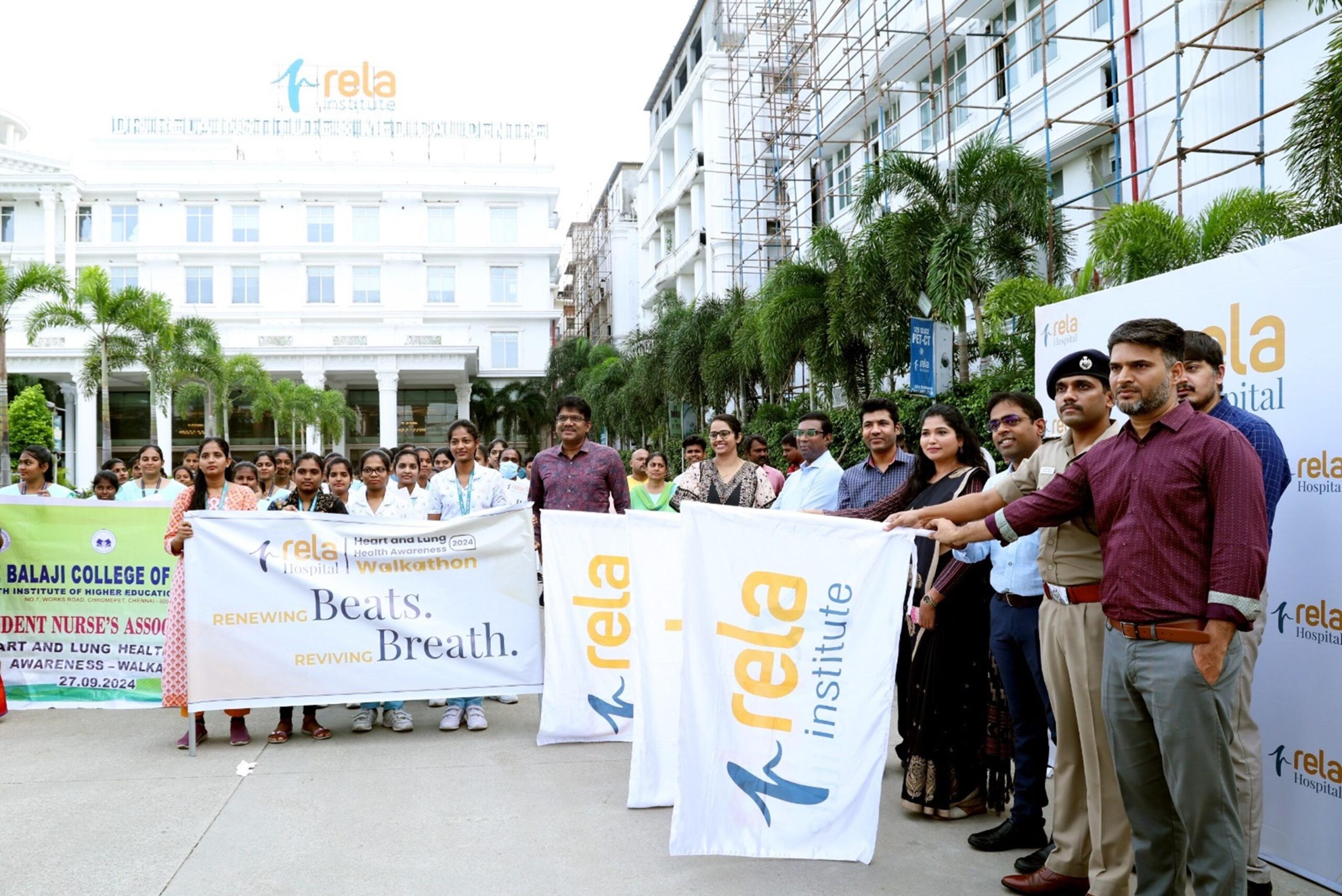Chennai, 27 September 2024: Rela Hospital organised a 5-km walkathon to raise awareness about lung and heart health, attracting over 500 participants, including doctors and students, in commemoration of World Lung Day and World Heart Day, which fall on September 25 and 29, respectively.
Mr. Pavan Kumar Reddy IPS, Deputy Commissioner of Police, Tambaram, flagged off the event in the presence of Dr. Ilankumaran Kaliamoorthy, CEO, Dr. Srinath Vijayasekharan, Director and Senior Consultant, Institute of Cardiac Sciences, and Dr. Aishwarya Rajkumar, Clinical Lead – Transplant Pulmonology, Rela Hospital.
The hospital is also hosting a free heart and lung health camp on September 29. This event is open to individuals experiencing symptoms related to heart or lung conditions. The heart health camp will be useful for people with symptoms such as palpitations, shortness of breath, dizziness, chest or upper body pain, heartburn, and swelling in the legs. The heart check to be conducted will include an ECG, an ECHO screening, and a consultation with a cardiologist. The lung health camp is best suited for individuals with chronic cough, persistent mucus production, wheezing, coughing up blood, or allergies. The lung check will feature a pulmonary function test, an x-ray screening, and a consultation with a pulmonologist. Smokers are also encouraged to attend the camp. To register for the camp, patients can call +91 8610682479
In his comments, Dr. Ilankumaran Kaliamoorthy said, “The role of a hospital extends beyond treating diseases; it is also vital in spreading awareness about disease prevention. At Rela Hospital, we actively conduct awareness programs, including walkathons on significant international health days. We focus particularly on heart and lung health because diseases related to these areas are leading causes of morbidity and mortality worldwide. There is an urgent need for the public to advocate for a cleaner environment and healthier lifestyles, as these factors significantly contribute to the development of these diseases. At the same time, we are committed to enhancing our expertise and integrating advanced technologies to alleviate suffering in these areas. Furthermore, we also partner with other hospitals and NGOs to extend our reach and provide our expertise for the benefit of patients beyond our immediate community.”
In his observations on World Heart Day, Dr. Srinath Vijayasekharan, said, “Cardiovascular diseases (CVDs) continue to rise due to factors like poor lifestyle choices, hypertension, and diabetes, among others. CVDs remain the leading cause of death globally, responsible for an estimated 17.9 million deaths each year. In India alone, heart disease accounts for over 25% of all deaths, with younger populations increasingly at risk. However, advances in medical technology—such as early diagnostic tools, minimally invasive procedures, and breakthrough treatments like stents and robot-assisted surgeries—have also greatly improved patient outcomes in recent years. Still, prevention is the key to reduce the burden of CVDs. We can protect our heart health by adopting healthier diets, staying physically active, and managing stress.”
In her comments, Dr. Aishwarya Rajkumar said, “On World Lung Day, we are reminded of the critical importance of healthy lung function, as our lungs provide oxygen essential for every cell and organ in the body. Without proper lung function, our overall health and quality of life decline. Chronic respiratory diseases like COPD and asthma affect over 500 million people worldwide. In India alone, air pollution contributes to 1.7 million deaths annually, with lung disease incidence steadily rising due to poor air quality, smoking, and occupational hazards. Fortunately, advances in medical technology, such as improved diagnostic tools, minimally invasive surgeries, and innovative treatments like targeted biologics, are transforming how we diagnose and treat lung diseases. These innovations offer hope for better outcomes, but preventive measures like clean air and regular check-ups remain essential.”

